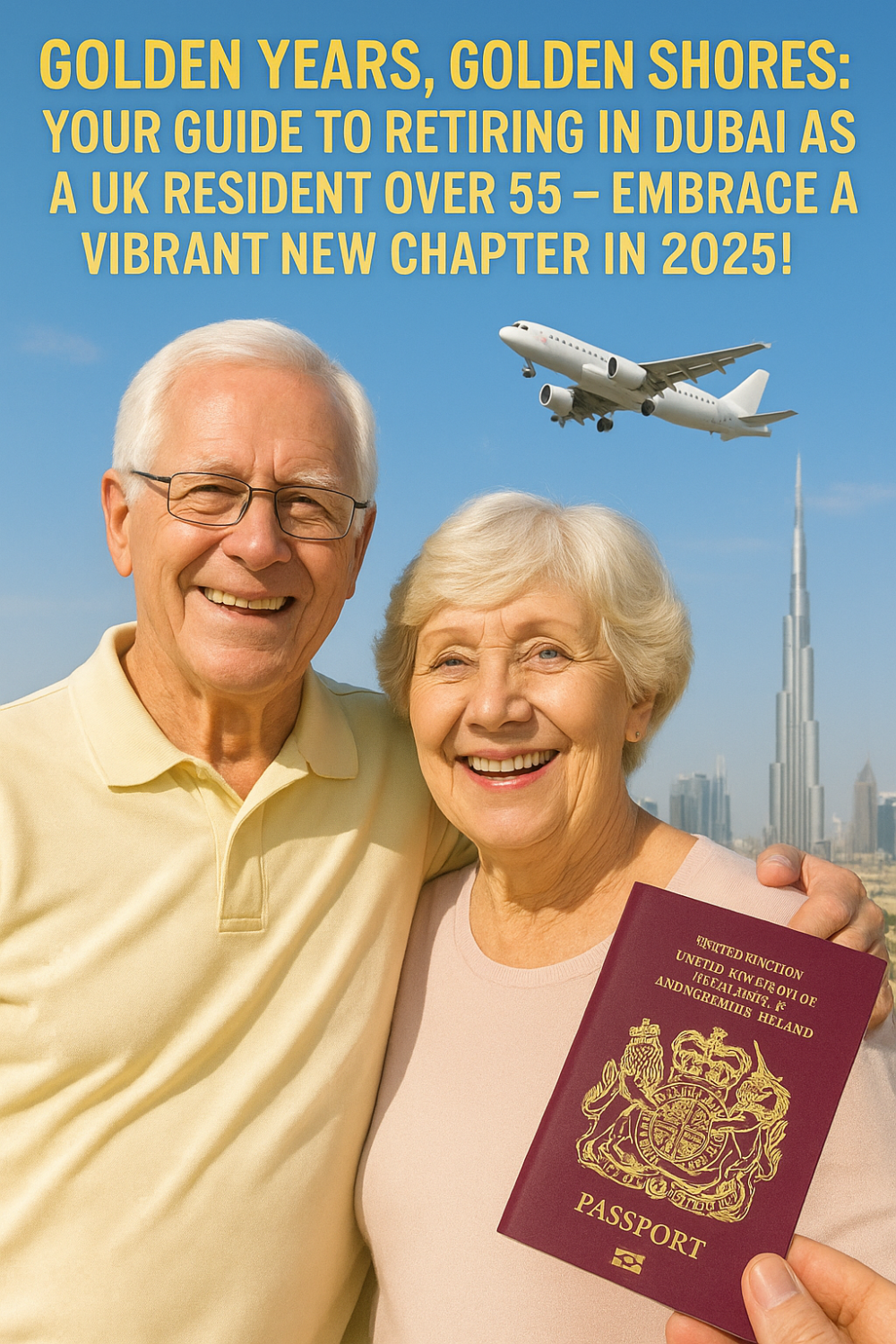Golden Years, Golden Shores: Your Guide to Retiring in Dubai as a UK Resident Over 55 – Embrace a Vibrant New Chapter in 2025!
Imagine trading chilly UK winters for year-round sunshine, exploring a dazzling cosmopolitan city, and enjoying a relaxed pace of life with world-class amenities. For UK residents over 55, this isn’t just a fantasy; it’s an increasingly attainable reality thanks to Dubai’s Retirement Visa! Consider this: a recent survey highlighted that over 30% of UK residents nearing retirement are actively considering overseas relocation for a better quality of life and financial advantages. Dubai, with its strategic location, safety, and attractive lifestyle, is emerging as a top contender. Ready to envision your retirement basking in the Arabian sun?
The allure of spending your golden years in Dubai goes beyond just the weather. It’s about embracing a vibrant culture, accessing excellent healthcare, and potentially benefiting from a more favourable tax environment. This isn’t about leaving your UK life behind entirely; it’s about strategically choosing a new base that enhances your retirement experience. Think about the possibilities: leisurely strolls along pristine beaches, exploring architectural marvels, indulging in world-class dining, and connecting with a diverse international community.
This comprehensive guide is specifically tailored for UK residents over 55 who are contemplating making Dubai their retirement haven in 2025. We will navigate the intricacies of the Retirement Visa, outlining the eligibility criteria, the application process, the best places to settle down, and crucial timing considerations. Get ready to discover how you can unlock a fulfilling and exciting new chapter in your life under the Dubai sun!
Why Dubai’s Retirement Visa is an Appealing Choice for UK Residents Over 55 in 2025
Several compelling reasons make Dubai’s Retirement Visa an increasingly attractive option for UK residents entering their retirement years:
1. Year-Round Sunshine and Outdoor Lifestyle: Let’s face it, the UK climate can be unpredictable. Dubai offers consistent sunshine and warm temperatures for most of the year, allowing for an active outdoor lifestyle. Imagine enjoying daily walks, swimming, golf, or simply relaxing outdoors without the constant threat of rain. This can significantly improve your physical and mental well-being.
2. High Quality of Life and World-Class Amenities: Dubai boasts a modern infrastructure, excellent healthcare facilities, high safety standards, and a wide range of leisure and entertainment options. From pristine beaches and luxurious malls to cultural attractions and world-class dining, Dubai offers a rich and fulfilling lifestyle. You’ll find everything you need for a comfortable and enjoyable retirement.
3. Cosmopolitan Environment and Diverse Community: Dubai is a melting pot of cultures, with a large and welcoming expatriate community. This makes it easier for newcomers to integrate and find social connections. You’ll have the opportunity to meet people from all over the world, broadening your horizons and enriching your retirement experience.
4. Potential Tax Advantages: While the UK has its own pension and tax regulations, some retirees may find the tax environment in Dubai, particularly the absence of income tax, potentially beneficial for managing their finances in retirement. It’s crucial to seek professional financial advice to understand the specific implications for your situation.
5. Excellent Healthcare System: Dubai has invested heavily in its healthcare infrastructure, offering world-class medical facilities and highly qualified professionals. Access to quality healthcare is a significant consideration for retirees, and Dubai excels in this area.
6. Strategic Location for Travel: Dubai’s central location and excellent air links make it a convenient base for exploring other parts of the world. Whether you want to visit family in the UK, explore Asia, or travel to Europe, Dubai offers easy access to numerous destinations.
7. Safety and Security: Dubai consistently ranks as one of the safest cities in the world. This provides peace of mind for retirees and allows you to enjoy your surroundings with confidence.
8. Opportunities for Leisure and Recreation: Dubai offers a vast array of activities catering to diverse interests, from golf courses and yacht clubs to cultural events and desert adventures. There’s always something new to explore and enjoy in your retirement.
What You Need to Do: Meeting the Requirements for Dubai’s Retirement Visa
To be eligible for Dubai’s Retirement Visa, UK residents over 55 typically need to meet one of the following financial criteria:
1. Financial Savings: You must have verifiable financial savings of no less than AED 1 million (approximately £215,000 as of May 2025). These funds should ideally be held in a fixed deposit or a low-risk investment account in the UAE. You will need to provide bank statements and investment portfolio details to prove the existence and source of these funds.
2. Active Income: You must demonstrate a regular monthly income of no less than AED 20,000 (approximately £4,300 as of May 2025) from sources such as pensions or other retirement benefits. You will need to provide official documentation confirming your income stream, such as pension statements or proof of other regular income.
3. Property Ownership: You must own one or more properties in Dubai with a total value of no less than AED 2 million (approximately £430,000 as of May 2025). You will need to provide title deeds and valuation certificates for your properties. It’s important to note that there might be specific requirements regarding whether the property is mortgaged.
Key Steps in the Application Process:
While the specific procedures may vary slightly depending on the relevant authorities and any updates to regulations, the general steps involved in obtaining a Dubai Retirement Visa typically include:
1. Gather Required Documentation: This is a crucial first step. You will need to collect various documents, which generally include: Passport: Your original passport with at least six months of validity remaining. Copies: Multiple clear colour copies of your passport’s bio page. Photographs: Recent passport-sized photographs meeting specific requirements. Proof of Financial Standing: Depending on the criteria you meet (savings, income, or property), you will need to provide: Savings: Bank statements for the last six months showing the required minimum balance, fixed deposit certificates, or investment portfolio statements. Income: Official pension statements, proof of other regular income, and bank statements showing consistent deposits. Property: Title deeds of properties in Dubai and recent valuation certificates. Marriage Certificate (if applicable): If you are applying with a spouse. Police Clearance Certificate: A recent police clearance certificate from the UK (and any other country you have resided in for a significant period). This will need to be attested. Medical Fitness Certificate: You will need to undergo a medical examination at an approved medical centre in Dubai. Visa Application Form: Completed application forms, which can usually be obtained from the relevant government authority or free zone. Other Supporting Documents: As may be requested by the authorities, such as proof of address in Dubai or a cover letter explaining your intention to retire in Dubai.
2. Choose Your Visa Sponsorship Route: Depending on your financial situation, you might apply directly through the General Directorate of Residency and Foreigners Affairs (GDRFA) or through a specific free zone that offers retirement visa sponsorship. Research the options and choose the most suitable route for you.
3. Submit Your Application: Once you have gathered all the required documents, you will need to submit your application through the designated channels. This might involve an online portal, a visit to a government service centre, or working with a visa processing agency.
4. Undergo Medical Examination: As part of the process, you will need to undergo a medical examination at a clinic approved by the Dubai Health Authority (DHA). This typically includes blood tests and a general health assessment.
5. Biometric Enrollment: You will likely need to undergo biometric enrollment, which involves providing fingerprints and having your photograph taken.
6. Visa Stamping: Once your application is approved and you have completed all the necessary steps, your residency visa will be stamped in your passport.
7. Emirates ID Registration: After receiving your residency visa, you will need to apply for an Emirates ID card, which is your official identification document in the UAE.
Important Note: The specific requirements and procedures can change, so it is crucial to consult the official websites of the GDRFA and relevant free zone authorities or seek guidance from reputable visa processing agencies for the most up-to-date information.
Best Places for Retirees to Live in Dubai: Finding Your Perfect Haven
Dubai offers a diverse range of residential areas, each with its unique charm and amenities. Here are some of the best places for retirees to consider:
1. Jumeirah Lakes Towers (JLT): This vibrant community features a mix of residential towers surrounding picturesque lakes. It offers a pedestrian-friendly environment with numerous cafes, restaurants, and shops within easy reach. JLT is known for its affordability compared to some other prime areas and its strong sense of community.
2. Dubai Marina: For those who enjoy waterfront living, Dubai Marina offers stunning views, a bustling promenade, and easy access to beaches. It’s a lively area with plenty of dining and entertainment options. While it can be a bit more expensive, the lifestyle appeals to many retirees.
3. The Springs and The Lakes: These established gated communities offer villas and townhouses with lush landscaping and a more suburban feel. They are known for their family-friendly environment and community amenities like parks, pools, and sports facilities. They provide a quieter retreat while still being relatively close to the city’s attractions.
4. Arabian Ranches: Another popular villa community, Arabian Ranches offers a more spacious and tranquil environment with golf courses, equestrian facilities, and community centers. It’s ideal for retirees seeking a more relaxed and outdoorsy lifestyle.
5. Downtown Dubai: For those who want to be in the heart of the action, Downtown Dubai offers iconic landmarks like the Burj Khalifa and the Dubai Mall, along with a vibrant cultural scene. It’s a more fast-paced environment but provides unparalleled access to world-class amenities.
6. Palm Jumeirah: If you dream of living on an iconic man-made island with beachfront access, Palm Jumeirah offers luxurious villas and apartments with stunning sea views. It’s a more exclusive and potentially expensive option but provides a unique lifestyle.
7. Jumeirah Beach Residence (JBR): Located along The Walk, JBR offers beachfront living with a lively promenade filled with cafes, restaurants, and shops. It’s a popular area for both residents and tourists, offering a vibrant social scene.
Factors to Consider When Choosing a Location:
- Proximity to Amenities: Consider your access to healthcare facilities, supermarkets, transportation, and leisure activities.
- Lifestyle Preference: Do you prefer a bustling city environment, a quiet suburban setting, or beachfront living?
- Budget: Property prices and rental costs vary significantly across different areas.
- Community Feel: Some communities have a stronger sense of community than others.
- Transportation Links: Consider your access to public transport or the ease of driving.
It’s highly recommended to visit Dubai and explore different areas before making a final decision on where to live. This will give you a firsthand feel for the environment and help you find the perfect place to enjoy your retirement.
Timing Your Application: When to Embark on Your Dubai Retirement Journey
Deciding when to apply for the Dubai Retirement Visa is an important consideration. Here are some factors to influence your timeline:
1. Your Retirement Date: Ideally, you should start the application process a few months before your intended retirement date to allow ample time for processing and relocation.
2. Financial Readiness: Ensure you meet the financial requirements for the visa and have your funds or income streams in order. Gather the necessary financial documentation well in advance.
3. Visa Processing Time: As with any visa application, processing times can vary. It’s wise to factor in potential delays and not leave the application to the last minute. Generally, the process can take a few weeks to a couple of months, depending on the authorities involved and the completeness of your application.
4. Property Search (if applicable): If you plan to meet the property ownership criteria, allow sufficient time to research and purchase property in Dubai. This can be a more time-consuming process.
5. Personal Circumstances: Consider any personal commitments or travel plans that might affect your ability to apply and relocate.
Can You Apply from the UK or on a Visitor Visa in Dubai?
Applying from the UK: Yes, it is generally possible to initiate the application process for a Dubai Retirement Visa while you are still in the UK. You can gather the necessary documentation and potentially submit an initial application through the relevant government portals or via a visa processing agency. However, you will likely need to travel to Dubai to complete certain stages, such as the medical examination and biometric enrollment, and to receive your residency visa.
Applying on a Visitor Visa in Dubai: Yes, it is also possible to apply for the Retirement Visa while you are in Dubai on a visitor visa. This allows you to explore the city, meet with authorities, and potentially finalise your property purchase (if applicable) before submitting your application. However, it’s crucial to ensure that your visitor visa allows for a change of status and that you comply with all immigration regulations. You will need to complete the application process through the relevant authorities while in Dubai and ensure your visitor visa remains valid throughout. Be aware of the potential for longer processing times if applying while on a visitor visa.
Recommendation: Regardless of your chosen application route, it is highly recommended to consult with the official websites of the GDRFA and any relevant free zone authorities or seek guidance from reputable visa processing agencies specializing in Dubai retirement visas. They can provide the most accurate and up-to-date information on the application procedures and requirements for non-resident applicants.
Who is Eligible to Apply for the Retirement Visa?
The primary eligibility criterion for the Dubai Retirement Visa is being over the age of 55. In addition to this, applicants must meet one of the aforementioned financial requirements (savings, income, or property ownership).
Key Eligibility Requirements:
- Age: The applicant must be 55 years of age or older.
- Financial Standing: The applicant must meet one of the following criteria:
- Possess verifiable financial savings of at least AED 1 million.
- Demonstrate a regular monthly income of at least AED 20,000.
- Own one or more properties in Dubai with a total value of at least AED 2 million.
- Good Standing: Applicants will typically need to have a clean criminal record and be in good health (as confirmed by the medical examination in Dubai).
- Valid Passport: Applicants must hold a valid passport with sufficient remaining validity.
- Spouse Sponsorship: Spouses can typically be sponsored under the Retirement Visa if they also meet certain criteria and provide the necessary documentation (such as a marriage certificate).
Important Note: The specific eligibility criteria and required documentation are subject to the regulations of the Dubai government and the relevant immigration authorities. It is essential to consult the official sources for the most accurate and up-to-date information.
Embrace Your Golden Years in the Golden City of Dubai!
For UK residents over 55, the Dubai Retirement Visa offers a remarkable opportunity to embrace a vibrant and fulfilling new chapter in their lives. The prospect of year-round sunshine, a high quality of life, world-class amenities, and a diverse community is incredibly appealing. By meeting the financial requirements and navigating the application process diligently, you can unlock the door to a comfortable and exciting retirement in one of the world’s most dynamic cities.
Imagine spending your days exploring stunning attractions, enjoying leisurely activities, and connecting with a global community, all while potentially benefiting from a more favorable financial environment. This isn’t just about retiring; it’s about reimagining your golden years and creating a truly exceptional experience.
So, if you are a UK resident over 55 dreaming of a change of scenery and a vibrant retirement, now is the time to explore the possibilities. Research the requirements, consider your preferred lifestyle and location, and take the first steps towards making Dubai your golden shores in 2025! Your exciting new adventure awaits!
Join our Retirement Club
Subscribe for free lifestyle improvement tips reviews and money saving ideas
Connect with us for free lifestyle improvement tips
Grow your business faster with CheeringUpInfo
Read more lifestyle improvement articles and view videos for free
Connect with us for free lifestyle improvement tips
Read and view more:
- Retire in Dubai over 55 UK citizen visa requirements
- Best areas to live in Dubai for UK retirees over 55
- How to apply for Dubai retirement visa from uk in 2025
- Financial requirements for Dubai retirement visa UK residents over 55
- Can UK citizens retire in Dubai on property ownership visa over 55
Relevant hashtags:
- #RetireToDubai
- #DubaiRetirementVisa
- #UKRetireesInDubai
- #Over55Travel
- #GoldenYearsDubai
Retire in Dubai over 55 UK citizen visa requirements


